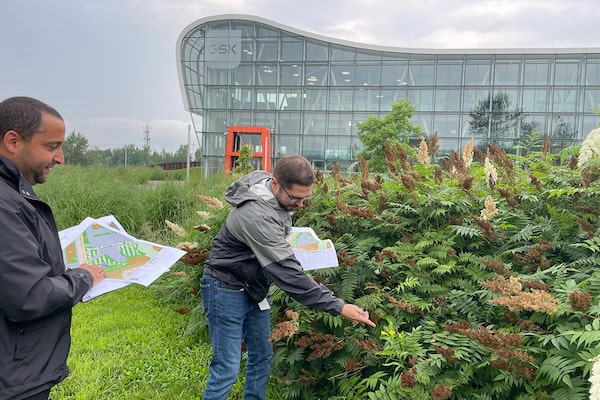
The community gardens, beehives and action plans at GSK drive its commitment to biodiversity as part of its goals for net-positive impact on nature by 2030.Provided
The ambition for GlaxoSmithKline (GSK) is to have a positive impact on 2.5 billion people by the end of the decade, and the global biopharma company isn’t just heading toward that goal by producing life-saving medicines and vaccines.
“Our work revolves around ensuring healthy people, and we understand that a healthy planet is crucial for achieving this,” says Isabelle Beaudoin, health, safety and environment director at GSK’s vaccines manufacturing site in Sainte-Foy, Que. “That’s why it’s so important to prioritize achieving our commitment to having a net-zero impact on the climate and a net-positive impact on nature by 2030.”
So when the company redesigned its Mississauga, Ont., head office and the Sainte-Foy site, it made sure its commitment to the environment was built right in – literally. Both offices are Leadership in Energy and Environmental Design (LEED) certified by the Canadian Green Building Council. “Reducing our environmental footprint was a top priority during construction,” says Beaudoin.
To that end, 75 per cent of the wood used at the Sainte-Foy site came from responsibly managed forests, certified by the Forest Stewardship Council. GSK implemented a rainwater recycling system so rainwater can be used for toilets, and installed geothermal wells to heat buildings with the Earth’s natural energy.
The Sainte-Foy buildings were even oriented to take advantage of natural light. “The north side of the building envelope was designed to conserve energy during the colder winter months,” Beaudoin says. “Every aspect of the building was meticulously planned to minimize our environmental impact.”
Outside the Sainte-Foy building, 10,000 hard-working bees play a crucial role as pollinators and don’t have to travel far to do so, as GSK’s community gardens are nearby. Every year, plots of land in the community gardens are allocated through a lottery system, and lucky employees have the opportunity to grow their own vegetables.
“It’s not just about physical health; it’s also about nurturing their well-being,” says Beaudoin. “During lunch breaks, you’ll often find employees taking walks in the gardens, enjoying the tranquillity and beauty of nature.”
Other notable initiatives include the implementation of a process whereby egg residues used in the production of flu vaccines are now transformed into valuable compost. The company has also optimized its washing machine used to clean egg trays. This has significantly reduced water consumption and the use of cleaning products.
GSK is paying attention to other details, as well. Ventolin (salbutamol) is one of GSK’s well-known respiratory medicines, relied on by approximately 35 million patients worldwide who have respiratory conditions. From a global perspective, there is work being done to explore the inhalers’ carbon footprint. In Canada, a dedicated team is focused on initiatives within the health plastics sector to make a positive difference.
Specifically, GSK is working toward finding solutions to the issue of the health-care plastics, especially inhalers, ending up in landfills. “We’re optimistic about finalizing a plan before the end of 2024 to effectively address this important issue,” says Alison Pozzobon, head of communications and pharma operations.
Prioritizing sustainability – reducing waste, conserving resources and implementing eco-friendly manufacturing processes – is not only the right thing to do for the planet and for the public, it aligns with the company’s mission to improve global health.
“The feeling among our staff is incredibly positive and enthusiastic – they’re not only supportive of making changes, but are actively involved in them,” Pozzobon adds. “We believe that creating a more sustainable future is a collective effort, and our employees play a crucial role in driving all these initiatives forward.”
More from Canada’s Greenest Employers
Advertising feature produced by Canada’s Top 100 Employers, a division of Mediacorp Canada Inc. The Globe and Mail’s editorial department was not involved.